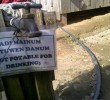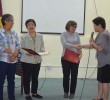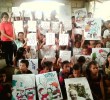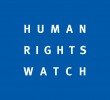DAVAO CITY—The Department of Health (DOH) has intensified its information, education and advocacy campaign on tuberculosis and leprosy diseases down to the grassroots level to help infected persons be cured.
As part of the continuing advocacy and education drive, Evelyn Gelito, DOH Region 11 nurse/coordinator for the National TB Program (NTP), reported that all barangay(village) health workers (BHWs) in Davao City will undergo an orientation on TB & leprosy in June.
In an interview, Gelito said BHWs play a vital role in helping TB and leprosy patients be healed, and thus avoid the spread of these diseases to others, especially to children.
Gelito said the advocacy campaign aims to encourage TB and leprosy patients to “religiously take medications and be fully cured.” She said there are still infected patients who do not come out in the open to get medication and become a public health hazard.
She explained that these infectious diseases are airborne or carried by the wind. “This is why the patients must be cured, otherwise, they could transmit the disease to others,” Gelito stressed.
She cited that TB, by the DOH official definition, can be transmitted from an infected person by coughing, sneezing, talking, laughing, or singing. Leprosy is caused by a bacteria and is also transmitted from one untreated person to another via the respiratory tract.
Gelito said one reason why persons with either TB or leprosy hesitate to get proper medication is because of the stigma of having these diseases. “They should not be embarrassed because TB and leprosy are curable if diagnosed early and treated properly,” she said. She added that consultation and medication are free are readily available at the Southern Philippines Medical Center (formerly Davao Medical Center) and at barangay health centers.
Gelito enumerated the signs and symptoms for infected individuals. She said an individual with TB had: a cough two weeks old or more, blood-stained phlegm, chest and back pains, shortness of breath, fever, chills, night sweats, a poor appetite, weight loss, and a general feeling of tiredness & illness. She also said leprosy symptoms included: reddish skin lesions, loss of sensation, enlarged peripheral nerves, muscle weakness in the hands, feet and/ or face.
Gelito stressed that individuals with any of these signs and symptoms should go to the health centers or private doctors for immediate and proper and immediate treatment.
For this year, the DOH’s continuing education and advocacy campaign kicked off as early as February with a forum involving barangay leaders who were oriented on TB and leprosy, Gelito said. She added that barangay leaders were also requested to hold information activities at their respective communities.
For leprosy, DOH spearheaded a “Kilatis Kutis” week in February to check on leprosy symptoms for walk-in individuals.
March 24 is World TB day. This year, a “TB in the workplace” program was launched in Compostela Valley. (PIA-XI)
IMPORTANT NOTICE: INBOX is an archive of press releases, statements, announcements, letters to the editors, and manifestos sent to Davao Today for publication. Please email your materials to davaotoday@gmail.com. Davao Today is not responsible for the content of these materials. The opinion expessed in these items does not reflect those of Davao Today and its staff. Please refer to our terms of use/disclaimer.










